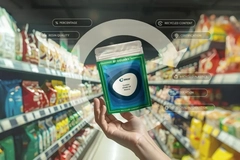Online grocery shopping drives UK plastic packaging waste crisis, study warns
Key takeaways
- University of Portsmouth researchers find online grocery shopping is creating invisible plastic packaging waste for consumers in the UK.
- Online shoppers are less aware of packaging waste because they spend less time considering purchases.
- The study links awareness campaigns to higher public engagement, showing that when consumers confront their waste, support for circular economy measures increases.

Online supermarket shopping is fuelling the UK’s plastic waste crisis, as packaging becomes increasingly invisible to consumers, according to the research from the Revolution Plastics Institute at the University of Portsmouth, UK.
The study, published in Environmental Science & Policy, reveals that nearly half of UK households underestimate the amount of plastic they throw away each week — a phenomenon researchers call “plastic blindness.” Those who rely on online grocery deliveries were most likely to be surprised by their plastic use once measured.
Dr. Kate Whitman from the Revolution Plastics Institute, lead author of the study, tells Packaging Insights: “Online shoppers spend less time thinking about their purchases than in-store shoppers. But this time saving comes at the cost of our awareness of waste, which is presumably fueling consumer complacency.”

“Consumers need to be confronted with their waste by images and information on the packaging labels and at the point of purchase.”
Increasing visibility
The study has combined information from three datasets gathered over two years. One of them is The Big Plastic Count, a UK citizen science project on household plastic waste, conducted in 2022 and 2024. The second one is a follow-up survey of more than 8,000 participants exploring attitudes to recycling reuse systems. The other source is a Greenpeace petition measuring whether participation in the Big Plastic Count influenced public action in support of “an ambitious” UN Global Plastics Treaty.
According to the findings, on average, UK households threw away 13 soft plastics, such as wrappers and film lids, and ten hard plastics, like yoghurt tubs. Soft plastics made up around 30% more waste overall.
 Dr. Kate Whitman from the Revolution Plastics Institute, lead author of the study.“Online retailers could help by making packaging impacts visible at the point of purchase — and by offering clear reuse or refill alternatives to single-use packaging,” says Whitman.
Dr. Kate Whitman from the Revolution Plastics Institute, lead author of the study.“Online retailers could help by making packaging impacts visible at the point of purchase — and by offering clear reuse or refill alternatives to single-use packaging,” says Whitman.
“Where packaging plays a part is in making online shoppers more aware of waste with warnings or additional information and using more sustainable materials. Furthermore, online shopping could facilitate more reuse/refill options in their products, and packaging design plays a big part in making this popular with consumers.”
Regulation and public messaging
The study highlights the power of public awareness campaigns. Participation in The Big Plastic Count coincided with a surge in signatures to a Greenpeace petition calling for a UN Global Plastics Treaty.
The survey also showed strong support for reuse and refill schemes, with 41% of respondents ranking clear environmental information among their top three factors influencing adoption, ahead of hygiene concerns or brand familiarity.
“We believe plastic blindness is a coping strategy. Consumers have little power to go completely plastic-free, so ignoring the waste we generate can feel necessary for peace of mind. But when that waste becomes impossible to overlook, concern rises and people become more willing to engage in reuse and refill systems,” Whitman shares.
“We need investment in the circular economy — reuse/refill/repair to make disposable consumption less appealing. But this needs to be underscored by strong, consistent public messaging, for example, to help consumers understand the waste hierarchy, where recycling is lower than refuse/reuse.”
The researchers argue that the UK government should introduce mandatory, standardized recycling labels to combat consumer confusion and misleading claims.
“Packaging regulation and standardization will certainly reduce waste. For example, some plastics can’t be recycled because of their coloring. Considering the issues related to mounting waste, this seems an ideal context for regulation,” she concludes.












